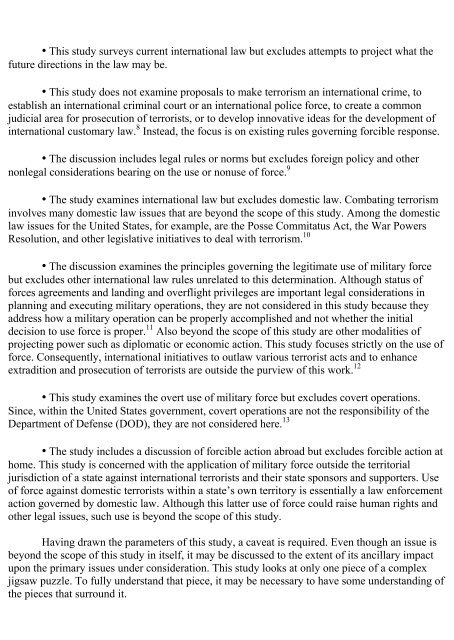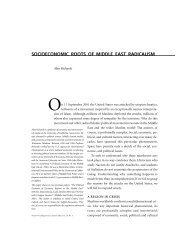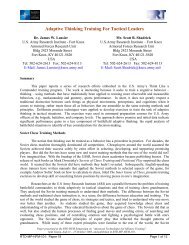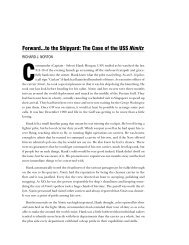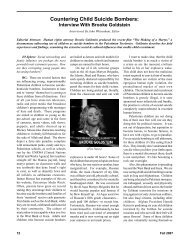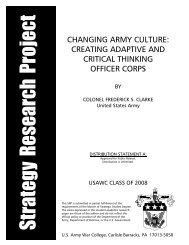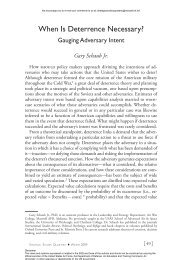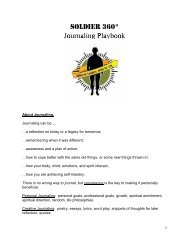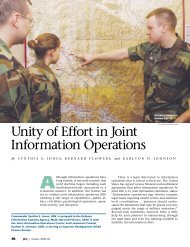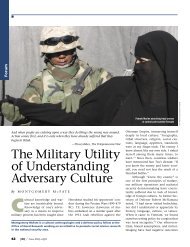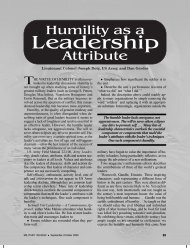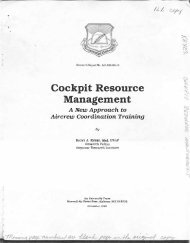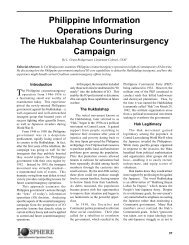Legitimate use of military force against state-sponsored - Air University
Legitimate use of military force against state-sponsored - Air University
Legitimate use of military force against state-sponsored - Air University
You also want an ePaper? Increase the reach of your titles
YUMPU automatically turns print PDFs into web optimized ePapers that Google loves.
• This study surveys current international law but excludes attempts to project what the<br />
future directions in the law may be.<br />
• This study does not examine proposals to make terrorism an international crime, to<br />
establish an international criminal court or an international police <strong>force</strong>, to create a common<br />
judicial area for prosecution <strong>of</strong> terrorists, or to develop innovative ideas for the development <strong>of</strong><br />
international customary law. 8 Instead, the focus is on existing rules governing forcible response.<br />
• The discussion includes legal rules or norms but excludes foreign policy and other<br />
nonlegal considerations bearing on the <strong>use</strong> or non<strong>use</strong> <strong>of</strong> <strong>force</strong>. 9<br />
• The study examines international law but excludes domestic law. Combating terrorism<br />
involves many domestic law issues that are beyond the scope <strong>of</strong> this study. Among the domestic<br />
law issues for the United States, for example, are the Posse Commitatus Act, the War Powers<br />
Resolution, and other legislative initiatives to deal with terrorism. 10<br />
• The discussion examines the principles governing the legitimate <strong>use</strong> <strong>of</strong> <strong>military</strong> <strong>force</strong><br />
but excludes other international law rules unrelated to this determination. Although status <strong>of</strong><br />
<strong>force</strong>s agreements and landing and overflight privileges are important legal considerations in<br />
planning and executing <strong>military</strong> operations, they are not considered in this study beca<strong>use</strong> they<br />
address how a <strong>military</strong> operation can be properly accomplished and not whether the initial<br />
decision to <strong>use</strong> <strong>force</strong> is proper. 11 Also beyond the scope <strong>of</strong> this study are other modalities <strong>of</strong><br />
projecting power such as diplomatic or economic action. This study foc<strong>use</strong>s strictly on the <strong>use</strong> <strong>of</strong><br />
<strong>force</strong>. Consequently, international initiatives to outlaw various terrorist acts and to enhance<br />
extradition and prosecution <strong>of</strong> terrorists are outside the purview <strong>of</strong> this work. 12<br />
• This study examines the overt <strong>use</strong> <strong>of</strong> <strong>military</strong> <strong>force</strong> but excludes covert operations.<br />
Since, within the United States government, covert operations are not the responsibility <strong>of</strong> the<br />
Department <strong>of</strong> Defense (DOD), they are not considered here. 13<br />
• The study includes a discussion <strong>of</strong> forcible action abroad but excludes forcible action at<br />
home. This study is concerned with the application <strong>of</strong> <strong>military</strong> <strong>force</strong> outside the territorial<br />
jurisdiction <strong>of</strong> a <strong>state</strong> <strong>against</strong> international terrorists and their <strong>state</strong> sponsors and supporters. Use<br />
<strong>of</strong> <strong>force</strong> <strong>against</strong> domestic terrorists within a <strong>state</strong>’s own territory is essentially a law en<strong>force</strong>ment<br />
action governed by domestic law. Although this latter <strong>use</strong> <strong>of</strong> <strong>force</strong> could raise human rights and<br />
other legal issues, such <strong>use</strong> is beyond the scope <strong>of</strong> this study.<br />
Having drawn the parameters <strong>of</strong> this study, a caveat is required. Even though an issue is<br />
beyond the scope <strong>of</strong> this study in itself, it may be discussed to the extent <strong>of</strong> its ancillary impact<br />
upon the primary issues under consideration. This study looks at only one piece <strong>of</strong> a complex<br />
jigsaw puzzle. To fully understand that piece, it may be necessary to have some understanding <strong>of</strong><br />
the pieces that surround it.


